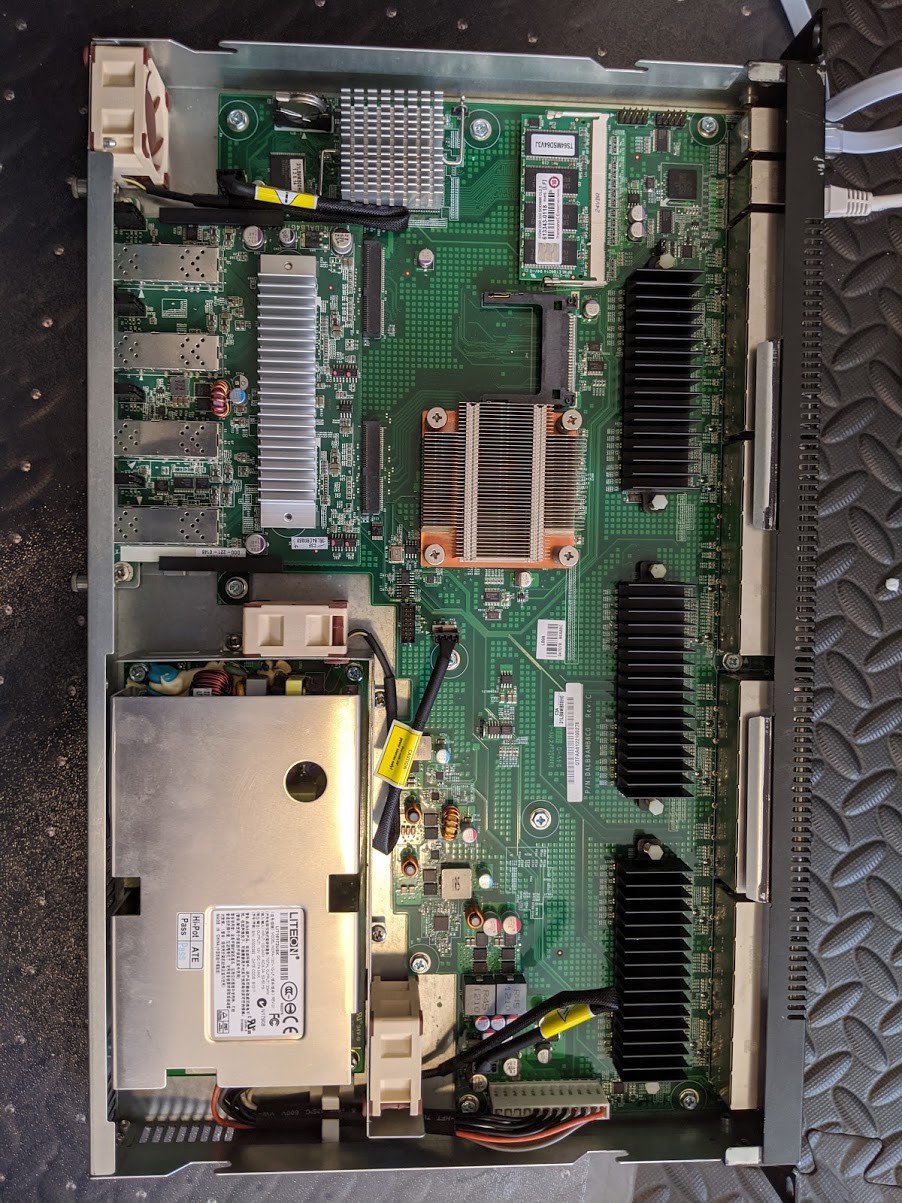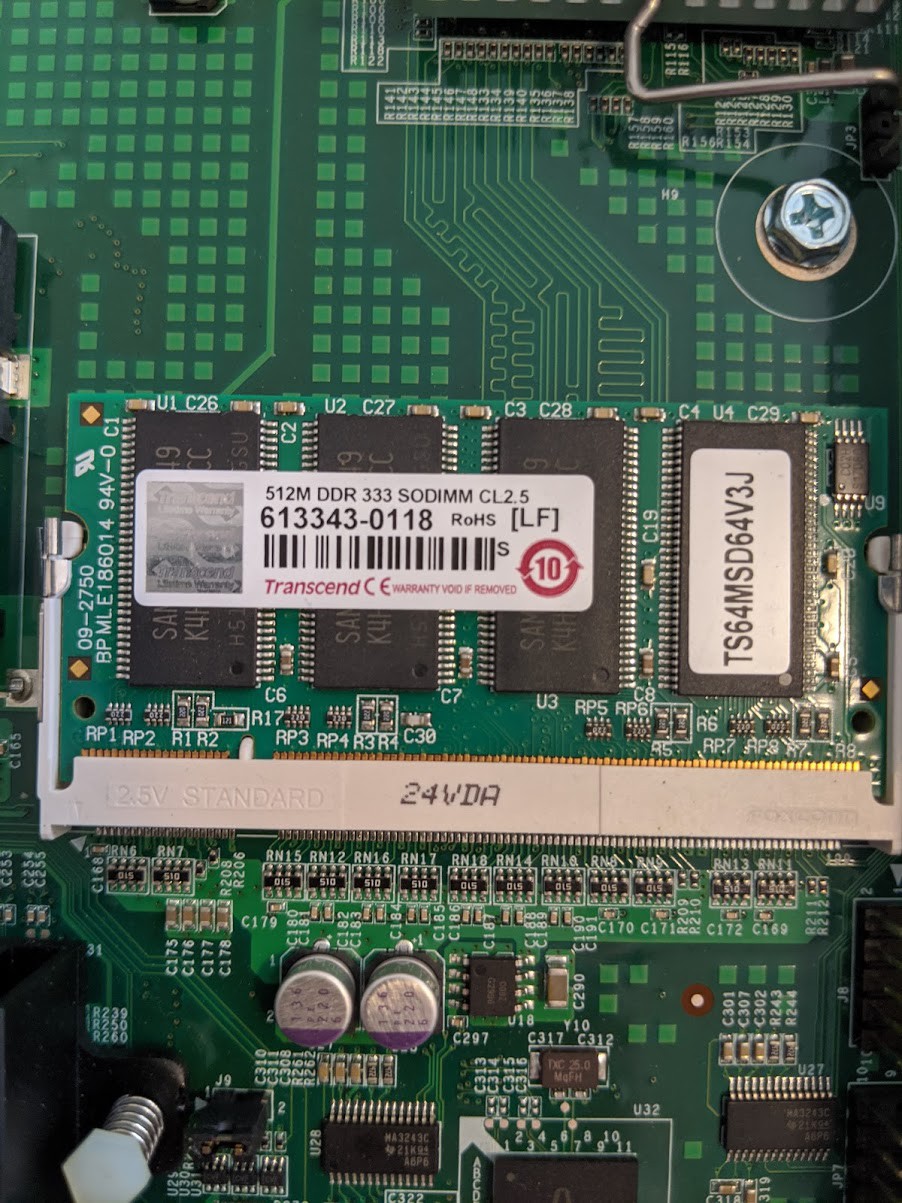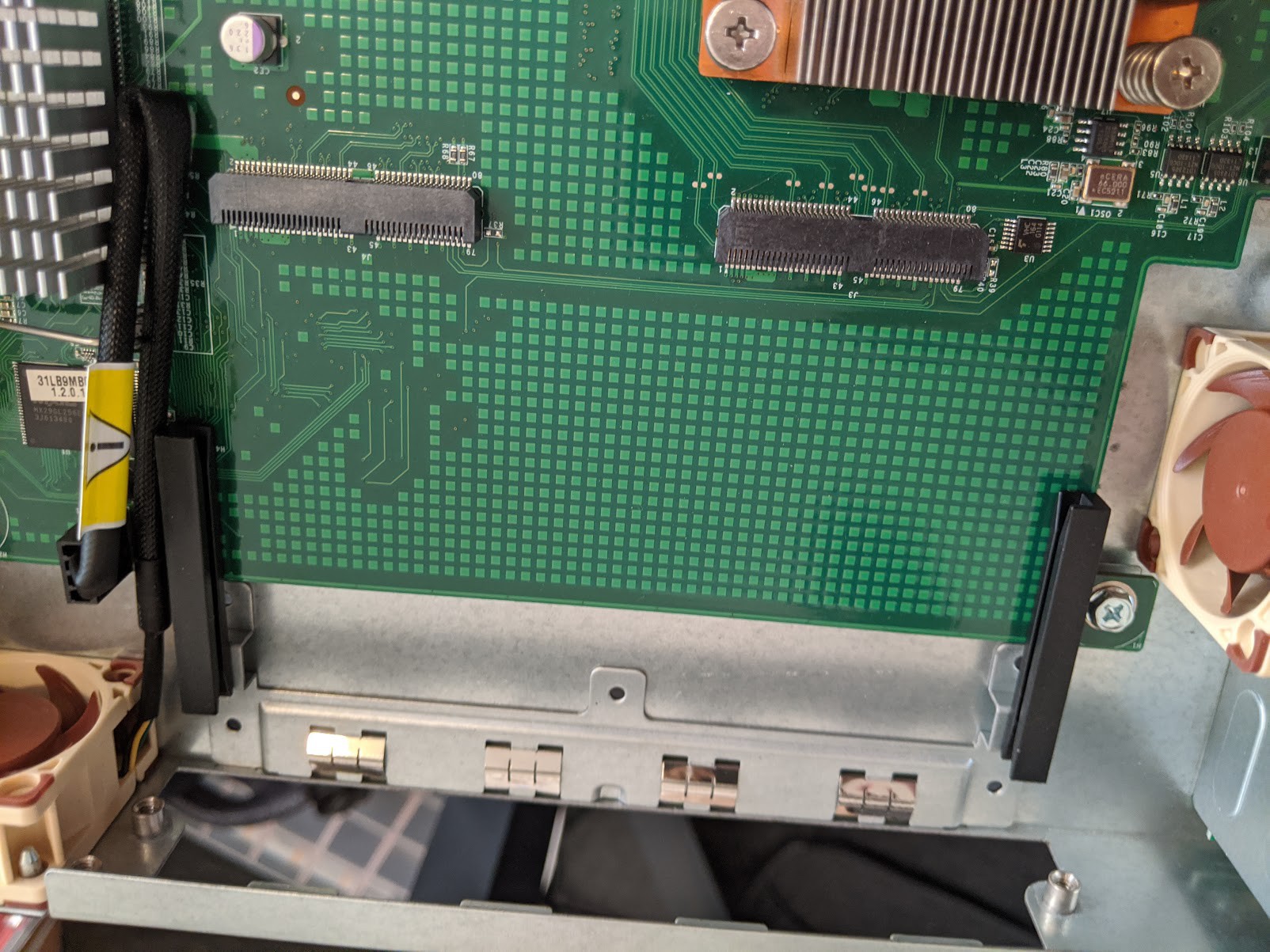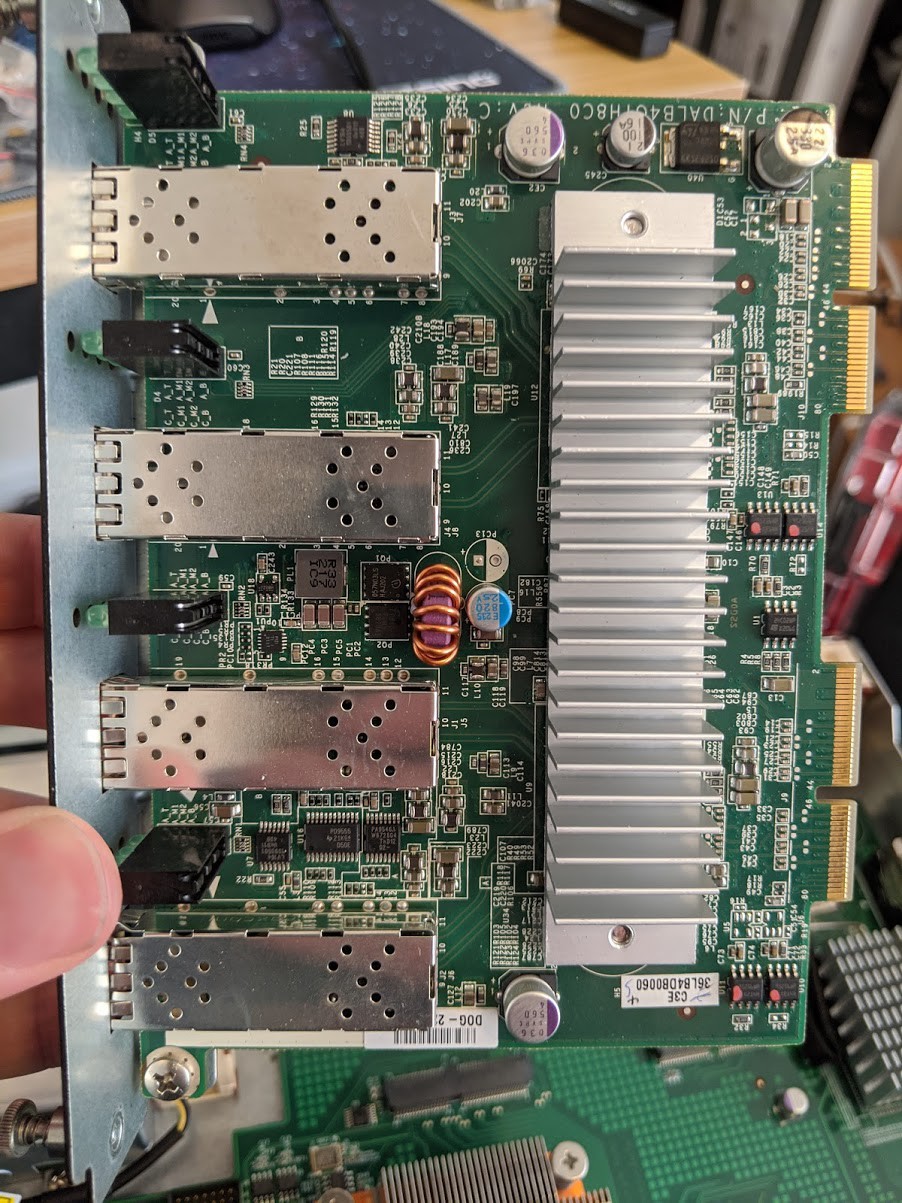-
We have to go back to go forwards
06/03/2020 at 18:43 • 0 commentsI've flashed an older revision of the bootloader (u-boot 1.3.0 vs 2009.06) and the device tree seems more correct. I have the IDE subsystem available and the CF card is visible. There seems to be a bit of trouble with either the card or the connection: at startup, the card details are reported as gibberish and an "ide reset" is required to print the actual details. I also get repeated "No Powersaving mode 59" errors while using the card, and all writes to the card have apparently failed (one attempt even took the boot record with it). I have ordered a few older cards that may play nicer.
I also took a few pictures of the internals while placing/removing the CF card, replaced the CR2032 for good measure.
![]()
![]()
RAM is 512MB DDR 333 SODIMM CL2.5, I've ordered a 1GB stick because why not?
![]()
Nothing interesting under the SFP daughterboard.
![]()
-
Digging Deeper
06/02/2020 at 17:00 • 0 commentsPartly because I like the latest version of things and partly because I want more experience with it, I think I'm going to attempt to upgrade U-Boot on this box.
I extracted the dts from a dtb I found online, for the Pronto 3290 (a renamed version of the same hardware):
/dts-v1/; / { model = "MPC8541CDS"; compatible = "MPC8541CDS\0MPC85xxCDS"; #address-cells = < 0x01 >; #size-cells = < 0x01 >; aliases { ethernet0 = "/soc8541@e0000000/ethernet@24000"; ethernet1 = "/soc8541@e0000000/ethernet@25000"; serial0 = "/soc8541@e0000000/serial@4500"; serial1 = "/soc8541@e0000000/serial@4600"; pci0 = "/pci@e0008000"; }; cpus { #address-cells = < 0x01 >; #size-cells = < 0x00 >; PowerPC,8541@0 { device_type = "cpu"; reg = < 0x00 >; d-cache-line-size = < 0x20 >; i-cache-line-size = < 0x20 >; d-cache-size = < 0x8000 >; i-cache-size = < 0x8000 >; timebase-frequency = < 0x00 >; bus-frequency = < 0x00 >; clock-frequency = < 0x00 >; next-level-cache = < 0x01 >; }; }; memory { device_type = "memory"; reg = < 0x00 0x20000000 >; }; soc8541@e0000000 { #address-cells = < 0x01 >; #size-cells = < 0x01 >; device_type = "soc"; compatible = "simple-bus"; ranges = < 0x00 0xe0000000 0x100000 >; reg = < 0xe0000000 0x1000 >; bus-frequency = < 0x00 >; memory-controller@2000 { compatible = "fsl,8541-memory-controller"; reg = < 0x2000 0x1000 >; interrupt-parent = < 0x02 >; interrupts = < 0x12 0x02 >; }; l2-cache-controller@20000 { compatible = "fsl,8541-l2-cache-controller"; reg = < 0x20000 0x1000 >; cache-line-size = < 0x20 >; cache-size = < 0x40000 >; interrupt-parent = < 0x02 >; interrupts = < 0x10 0x02 >; linux,phandle = < 0x01 >; }; i2c@3000 { #address-cells = < 0x01 >; #size-cells = < 0x00 >; cell-index = < 0x00 >; compatible = "fsl-i2c"; reg = < 0x3000 0x100 >; interrupts = < 0x2b 0x02 >; interrupt-parent = < 0x02 >; dfsrr; }; dma@21300 { #address-cells = < 0x01 >; #size-cells = < 0x01 >; compatible = "fsl,mpc8541-dma\0fsl,eloplus-dma"; reg = < 0x21300 0x04 >; ranges = < 0x00 0x21100 0x200 >; cell-index = < 0x00 >; dma-channel@0 { compatible = "fsl,mpc8541-dma-channel\0fsl,eloplus-dma-channel"; reg = < 0x00 0x80 >; cell-index = < 0x00 >; interrupt-parent = < 0x02 >; interrupts = < 0x14 0x02 >; }; dma-channel@80 { compatible = "fsl,mpc8541-dma-channel\0fsl,eloplus-dma-channel"; reg = < 0x80 0x80 >; cell-index = < 0x01 >; interrupt-parent = < 0x02 >; interrupts = < 0x15 0x02 >; }; dma-channel@100 { compatible = "fsl,mpc8541-dma-channel\0fsl,eloplus-dma-channel"; reg = < 0x100 0x80 >; cell-index = < 0x02 >; interrupt-parent = < 0x02 >; interrupts = < 0x16 0x02 >; }; dma-channel@180 { compatible = "fsl,mpc8541-dma-channel\0fsl,eloplus-dma-channel"; reg = < 0x180 0x80 >; cell-index = < 0x03 >; interrupt-parent = < 0x02 >; interrupts = < 0x17 0x02 >; }; }; mdio@24520 { #address-cells = < 0x01 >; #size-cells = < 0x00 >; compatible = "fsl,gianfar-mdio"; reg = < 0x24520 0x20 >; ethernet-phy@0 { reg = < 0x01 >; device_type = "ethernet-phy"; linux,phandle = < 0x03 >; }; ethernet-phy@1 { reg = < 0x02 >; device_type = "ethernet-phy"; linux,phandle = < 0x04 >; }; }; ethernet@24000 { cell-index = < 0x00 >; device_type = "network"; model = "TSEC"; compatible = "gianfar"; reg = < 0x24000 0x1000 >; local-mac-address = [ 00 00 00 00 00 00 ]; interrupts = < 0x1d 0x02 0x1e 0x02 0x22 0x02 >; interrupt-parent = < 0x02 >; phy-handle = < 0x03 >; }; ethernet@25000 { cell-index = < 0x01 >; device_type = "network"; model = "TSEC"; compatible = "gianfar"; reg = < 0x25000 0x1000 >; local-mac-address = [ 00 00 00 00 00 00 ]; interrupts = < 0x23 0x02 0x24 0x02 0x28 0x02 >; interrupt-parent = < 0x02 >; phy-handle = < 0x04 >; }; serial@4500 { cell-index = < 0x00 >; device_type = "serial"; compatible = "ns16550"; reg = < 0x4500 0x100 >; clock-frequency = < 0x00 >; interrupts = < 0x2a 0x02 >; interrupt-parent = < 0x02 >; }; serial@4600 { cell-index = < 0x01 >; device_type = "serial"; compatible = "ns16550"; reg = < 0x4600 0x100 >; clock-frequency = < 0x00 >; interrupts = < 0x2a 0x02 >; interrupt-parent = < 0x02 >; }; crypto@30000 { compatible = "fsl,sec2.0"; reg = < 0x30000 0x10000 >; interrupts = < 0x2d 0x02 >; interrupt-parent = < 0x02 >; fsl,num-channels = < 0x04 >; fsl,channel-fifo-len = < 0x18 >; fsl,exec-units-mask = < 0x7e >; fsl,descriptor-types-mask = < 0x1010ebf >; }; pic@40000 { interrupt-controller; #address-cells = < 0x00 >; #interrupt-cells = < 0x02 >; reg = < 0x40000 0x40000 >; compatible = "chrp,open-pic"; device_type = "open-pic"; linux,phandle = < 0x02 >; }; cpm@919c0 { #address-cells = < 0x01 >; #size-cells = < 0x01 >; compatible = "fsl,mpc8541-cpm\0fsl,cpm2"; reg = < 0x919c0 0x30 >; ranges; muram@80000 { #address-cells = < 0x01 >; #size-cells = < 0x01 >; ranges = < 0x00 0x80000 0x10000 >; data@0 { compatible = "fsl,cpm-muram-data"; reg = < 0x00 0x2000 0x9000 0x1000 >; }; }; brg@919f0 { compatible = "fsl,mpc8541-brg\0fsl,cpm2-brg\0fsl,cpm-brg"; reg = < 0x919f0 0x10 0x915f0 0x10 >; }; pic@90c00 { interrupt-controller; #address-cells = < 0x00 >; #interrupt-cells = < 0x02 >; interrupts = < 0x2e 0x02 >; interrupt-parent = < 0x02 >; reg = < 0x90c00 0x80 >; compatible = "fsl,mpc8541-cpm-pic\0fsl,cpm2-pic"; }; }; }; pci@e0008000 { cell-index = < 0x00 >; interrupt-map-mask = < 0x1f800 0x00 0x00 0x07 >; interrupt-map = < 0x9000 0x00 0x00 0x01 0x02 0x03 0x01 >; interrupt-parent = < 0x02 >; interrupts = < 0x18 0x02 >; bus-range = < 0x00 0x00 >; ranges = < 0x2000000 0x00 0x80000000 0x80000000 0x00 0x20000000 0x1000000 0x00 0x00 0xe2000000 0x00 0x100000 >; clock-frequency = < 0x3f940aa >; #interrupt-cells = < 0x01 >; #size-cells = < 0x02 >; #address-cells = < 0x03 >; reg = < 0xe0008000 0x1000 >; compatible = "fsl,mpc8540-pci"; device_type = "pci"; }; localbus@f0010100 { #address-cells = < 0x02 >; #size-cells = < 0x01 >; compatible = "fsl,mpc8541-localbus\0fsl,pq2-localbus\0simple-bus"; reg = < 0xf0010100 0x40 >; ranges = < 0x00 0x00 0xfe000000 0x2000000 0x01 0x00 0xf0000000 0x20000 0x02 0x00 0xf0010000 0x10000 0x03 0x00 0xf2000000 0x100000 0x04 0x00 0xe0000000 0x02 >; cfcard@1 { compatible = "qci-ide"; device_type = "ide"; reg = < 0x01 0x00 0x20000 0x04 0x00 0x100000 >; ioport_shift = < 0x01 >; reg-shift = < 0x01 >; #interrupt-cells = < 0x01 >; interrupts = < 0x02 0x02 >; interrupt-parent = < 0x02 >; }; }; };Scanning the /proc/device-tree on the running switch yields
# ls -R /proc/device-tree/ /proc/device-tree/: #address-cells chosen linux,phandle name #size-cells compatible memory soc8541@e0000000 aliases cpus model /proc/device-tree/aliases: name serial0 serial1 /proc/device-tree/chosen: bootargs linux,initrd-start name linux,initrd-end linux,stdout-path /proc/device-tree/cpus: #address-cells #size-cells name #cpus PowerPC,8541@0 /proc/device-tree/cpus/PowerPC,8541@0: 32-bit device_type reg bus-frequency linux,phandle timebase-frequency clock-frequency name /proc/device-tree/memory: device_type linux,phandle name reg /proc/device-tree/soc8541@e0000000: #address-cells ethernet@24000 name serial@4500 #interrupt-cells ethernet@25000 pci@8000 serial@4600 #size-cells i2c@3000 pic@40000 bus-frequency linux,phandle ranges device_type mdio@24520 reg /proc/device-tree/soc8541@e0000000/ethernet@24000: #address-cells device_type linux,phandle name #size-cells interrupt-parent local-mac-address phy-handle compatible interrupts model reg /proc/device-tree/soc8541@e0000000/ethernet@25000: #address-cells device_type linux,phandle name #size-cells interrupt-parent local-mac-address phy-handle compatible interrupts model reg /proc/device-tree/soc8541@e0000000/i2c@3000: compatible dfsrr interrupts name device_type interrupt-parent linux,phandle reg /proc/device-tree/soc8541@e0000000/mdio@24520: #address-cells device_type linux,phandle #size-cells ethernet-phy@1 name compatible ethernet-phy@2 reg /proc/device-tree/soc8541@e0000000/mdio@24520/ethernet-phy@1: device_type linux,phandle name reg /proc/device-tree/soc8541@e0000000/mdio@24520/ethernet-phy@2: device_type linux,phandle name reg /proc/device-tree/soc8541@e0000000/pci@8000: #address-cells compatible interrupts #interrupt-cells device_type linux,phandle #size-cells interrupt-map name bus-range interrupt-map-mask ranges clock-frequency interrupt-parent reg /proc/device-tree/soc8541@e0000000/pic@40000: #address-cells clock-frequency linux,phandle #interrupt-cells compatible name big-endian device_type reg built-in interrupt-controller /proc/device-tree/soc8541@e0000000/serial@4500: clock-frequency device_type interrupts name compatible interrupt-parent linux,phandle reg /proc/device-tree/soc8541@e0000000/serial@4600: clock-frequency device_type interrupts name compatible interrupt-parent linux,phandle regParsing deeper than this is difficult, as the linux build on the system lacks a lot of essential tools like hexdump that would allow me to read the raw values on the tree.
Of specific note is the root node /proc/device-tree/compatible, which is LB4M.
It's possible this system is running a contorted LB4M firmware, but everywhere else it identifies as a LB9A. It would also be a very odd change, since the LB4M apparently ran a VXWorks kernel under the hood, with a few hardware differences as well. One quirk supports the possibility; when booting I get an error relating to connecting the Ethernet PHY and the two front panel OOB management ports don't work. I can ping out on them in U-Boot, so I know the hardware is good.
This software is definitely not stock, as it has overwritten the default recovery tools as well. I almost want to buy another of these switches from another vendor to see if I can get a different draw on firmware.
-
Software
05/31/2020 at 23:05 • 0 commentsNot much is available on the internet discussing the firmware provided by Quanta for this switch. It seems to be a little brother to the LB9 switch, and shares most functionality.
This particular switch was obtained secondhand from ebay for $130, so the history and prior configuration is unknown. The CF card was removed, so it is running only from the image(s) on the flash.
It boots into a functional FASTPATH environment, but the version doesn't seem to be quite right for the hardware, I get two errors on boot :
ifconfig: SIOCSIFFLAGS: No such device net eth0: could not attach to PHY
These refer to the management ports (a BCM5482, ETH1/ETH2 on front panel), which don't work with the linux image.
There's also some oddity about how the version of the software is numbered, 2.0.0.1 seems marvelously round to me.
(Switching) #show hardware Switch: 1 System Description............................. Quanta LB9A, 2.0.0.1, Linux 2.6.34.6, U-Boot 2009.06 (Apr 19 2011 - 15:59:24) Machine Type................................... Quanta LB9A Machine Model.................................. LB9A Serial Number.................................. QTFCA62220249 FRU Number..................................... 1LB9BZZ0STH Part Number.................................... BCM56538 Maintenance Level.............................. A Manufacturer................................... 0xbc00 Burned In MAC Address.......................... 04:7D:7B:B0:A8:8C Software Version............................... 2.0.0.1 Operating System............................... Linux 2.6.34.6 Network Processing Device...................... BCM56538_B0 Additional Packages............................ QOS IPv6 Management Data Center OpEN API Prototype Open APIThe u-boot version is quite old, but using the md command I dumped the firmware to a serial log and used this utility to convert it to a straight hex dump. This should be in files (memdump.bin)
-
Fan replacement
05/31/2020 at 23:03 • 0 commentsThe first thing I noticed about this switch is that it is quite loud. Not unexpected for an old 1u rackmount switch.
Three AVC DV04028B12U fans pull air through the chassis. One provides straight flow, while two push air over the power supply.
I replaced these fans with Noctua A4x20 fans, which reduced chassis noise significantly.
 Connor Huffine
Connor Huffine


